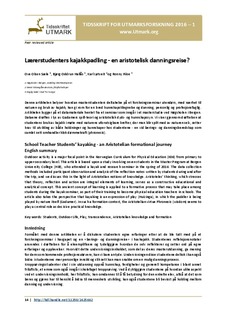Lærerstudenters kajakkpadling - en aristotelisk danningsreise?
Journal article, Peer reviewed

Åpne
Permanent lenke
http://hdl.handle.net/11250/2425662Utgivelsesdato
2016Metadata
Vis full innførselSamlinger
- Tidsskriftet Utmark [67]
Sammendrag
Denne artikkelen belyser hvordan masterstudenters deltakelse på et forskningsseminar utendørs, med nærhet til naturen og bruk av kajakk, kan gi rom for en bred kunnskapstilegnelse og danning, personlig og profesjonsfaglig. Artikkelen bygger på et datamateriale hentet fra et seminar som inngår i et masterstudie ved Høgskolen i Bergen. Dataene drøftes i lys av Gadamers spill-teori og aristotelisk dyds- og kunnskapssyn. Vi viser gjennom drøftelsen at studentens bruk av kajakk i møte med naturens uforutsigbare krefter, der man blir spilt med av naturen selv, setter krav til utvikling av både holdninger og kunnskaper hos studentene - en vid lærings- og danningsberedskap som samlet sett omhandler klok dømmekraft (phronesis). Outdoor activity is a major focal point in the Norwegian Curriculum for Physical Education (K06) from primary to upper-secondary level. This article is based upon a study involving seven students in the Master Program at Bergen University College (HiB), who attended a kayak and research seminar in the spring of 2016. The data collection methods included participant observation and analysis of the reflection-notes written by students during and after the trip, and we discuss this in the light of Aristotelian notions of knowledge. Aristoteles’ thinking, which stresses that theory, reflection and action are integral elements of learning, serves as a constructive educational and analytical concept. This ancient concept of learning is applied to a formative process that may take place among students during the kayak seminar, as part of their training to become physical education teachers in schools. The article also takes the perspective that kayaking is an expression of play (Huizinga), in which the paddler is being played by nature itself (Gadamer). In such a formation context, the Aristotelian virtue Phronesis (wisdom) seems to play a central role as decisive practical knowledge.